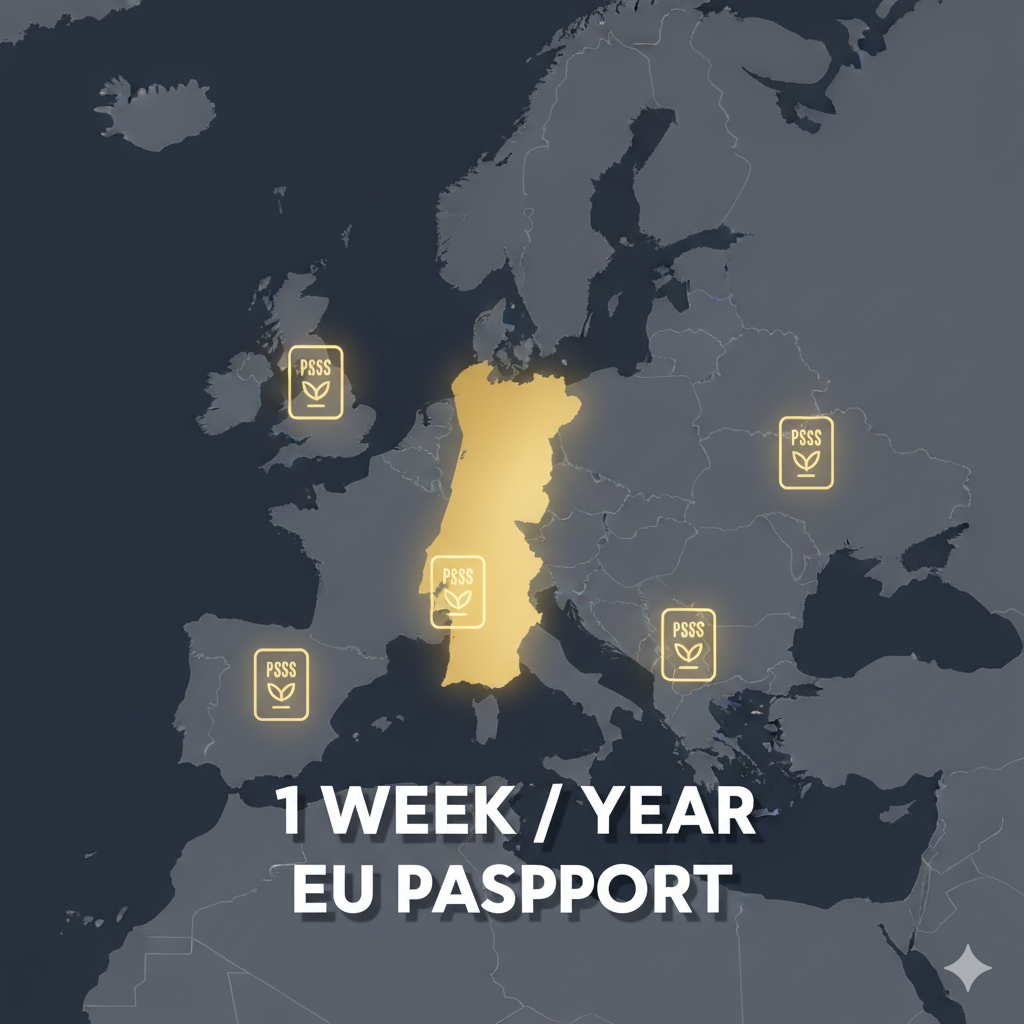How to Get EU Citizenship by Spending Just One Week a Year in Portugal
You don’t have to move countries for EU citizenship or free healthcare. Portugal’s Golden Visa lets you qualify by investing & visiting just one week per year.

A Shortcut to Europe That’s Completely Legal — and Surprisingly Attainable
For decades, moving to Europe meant uprooting your life — changing jobs, shifting families, and paying European taxes year-round. But Portugal quietly changed that playbook.
It’s now possible to secure EU residency, free healthcare, and eventual dual citizenship by investing in the country and spending as little as seven days per year there.
The secret lies in Portugal’s Golden Visa program, officially called the Autorização de Residência para Investimento (ARI). Introduced in 2012, it was designed to attract global investors after the Eurozone crisis — but it evolved into one of the most flexible citizenship pathways in the world.
By 2025, over 12,000 investors and 20,000 family members had benefited, injecting more than €7 billion into the Portuguese economy — while many continued living in their home countries, visiting Portugal for just a week each year to maintain status.
The Foundation: Residency Before Citizenship
Portugal doesn’t hand out citizenship instantly. Instead, it offers a temporary residence permit that can lead to citizenship after five years of lawful residence.
The key is that under the Golden Visa program, this “residence” doesn’t require living in Portugal full-time. You only need to spend seven days in the first year, and 14 days total over the following two years — roughly a week per year.
Those minimal visits — often used for renewals, banking, or leisure — are enough to maintain residency and progress toward naturalization.
At the end of five years, you can apply for citizenship, provided you’ve:
- Maintained your investment,
- Kept a clean criminal record,
- Passed a basic Portuguese language test (A2 level), and
- Demonstrated ties or knowledge of the country (usually through residence and documentation).
Once citizenship is granted, you gain all EU rights: the ability to live, work, and study anywhere in the European Union, access free or subsidized healthcare and education, and travel visa-free to 190+ countries.
What Counts as a Qualifying Investment
Portugal’s program used to be famous for its real estate option — buying an apartment or property worth at least €500,000. But after widespread local housing concerns, that option officially ended in October 2023.
The government redirected the program toward productive and cultural sectors. As of 2025, the main qualifying investments include:
- Contributing €500,000 or more to regulated venture capital or private equity funds that invest in Portuguese businesses, innovation, or startups.
- Investing €500,000 in scientific or technological research under government-approved institutions.
- Supporting cultural or heritage preservation projects with contributions starting at €250,000.
- Establishing a new business that creates at least 10 jobs in Portugal.
All investments must remain active throughout the five-year period. Early withdrawal or non-compliance with documentation can lead to cancellation of the residence permit.
Each investor must also secure a Portuguese tax number (NIF) and maintain a local bank account to process and verify transactions.
Why Portugal Is Unique Among EU Options
Several EU nations — including Spain, Greece, and Malta — offer residency-by-investment.
However, Portugal’s program remains distinct because of its low physical-stay requirement, fastest naturalization timeline, and liberal dual-citizenship policy.
Most countries require at least six months of annual residence for five to ten years before citizenship. Portugal asks for a total of 35 days in five years — a fraction of the time.
You’re not automatically taxed in Portugal unless you stay over 183 days a year or register as a tax resident. This makes it ideal for global professionals, entrepreneurs, or investors who want a second passport without relocating or shifting tax bases.
The Step-by-Step Process
- Choose the investment path. Applicants decide whether to invest through funds, cultural contributions, or research programs.
- Open a Portuguese bank account and obtain a tax number (NIF). This can be done remotely or through legal representatives.
- Transfer funds and complete the investment. Proof of transfer and compliance is mandatory.
- Submit your Golden Visa application online via the ARI portal.
- Provide documentation: passport, criminal record certificates, proof of income, and proof of investment.
- Attend a biometrics appointment in Portugal.
- Receive the residence permit, valid for two years.
- Renew every two years until the fifth year, maintaining the minimum stay requirement.
- Apply for citizenship after five years of residence.
The initial approval process typically takes 8–12 months, depending on case load at SEF (Portugal’s immigration authority).
The Benefits: From Healthcare to Global Mobility
Once you hold permanent residency or citizenship, you gain access to Portugal’s national healthcare system (SNS).
The SNS is government-funded and provides universal coverage, with most doctor consultations and treatments costing only a few euros.
As an EU citizen, you also receive the European Health Insurance Card (EHIC), which allows you to access healthcare across all EU and EEA countries under the same terms as citizens of those states.
Education benefits are equally strong — children and dependents gain access to public schooling, while EU university fees are often one-third to one-half lower than those for non-EU international students.
With a Portuguese passport, you also enjoy visa-free or visa-on-arrival access to 190+ destinations, including the US (under ESTA), Canada, the UK, and the entire Schengen Zone.
The Costs and Hidden Realities
While Portugal’s program is considered affordable by EU standards, it isn’t cheap.
Applicants should budget for:
- Minimum €250,000–€500,000 investment, depending on route.
- Government fees: around €5,300 for the initial application, and €2,500–€3,000 for each renewal.
- Legal and advisory costs: typically €8,000–€20,000, depending on the firm.
- Annual fund management fees: 1–2% for financial investments.
For families applying together, costs scale with each dependent, though the same investment can cover spouse and minor children.
There are also practical challenges:
- Language Test: Even though A2 is a beginner level, it still requires structured study and familiarity with conversational Portuguese.
- Policy Risks: Immigration rules can evolve. Portugal has already phased out property investments — future governments could raise thresholds or tighten criteria.
- Verification Delays: Backlogs at SEF can slow renewals, especially after the 2023 restructuring into the new AIMA (Agency for Migration and Asylum).
Alternative Route: The D7 Passive Income Visa
Not everyone wants to invest large sums. The D7 Visa, known as the “passive income” or “retirement visa,” offers another route to residency.
Applicants qualify by showing stable recurring income, such as pension payments, rental income, dividends, or freelance earnings.
As of 2025, the minimum requirement is around €820 per month (the Portuguese minimum wage), or about €9,800 per year, plus proof of accommodation and health insurance.
While the D7 requires a longer stay — roughly six months per year in Portugal — it leads to the same citizenship rights after five years.
This option is popular with retirees, remote workers, and digital nomads under Portugal’s Non-Habitual Resident (NHR) tax regime, which provides 10 years of reduced tax rates for foreign income.
Why It’s a Game-Changer for Global Citizens
Portugal’s residency pathways are not only legal but also practical for those seeking flexibility.
Many investors from India, the UAE, the US, and Southeast Asia use it as a “Plan B passport” — a hedge against geopolitical or economic uncertainty.
For Indian nationals, whose passport offers visa-free access to only 62 destinations, Portuguese citizenship represents a jump to 190+, unlocking the entire EU, UK, and North America through visa waivers.
Dual nationality is fully permitted under Portuguese law, making this particularly appealing for those who don’t want to renounce their home country’s citizenship.
Potential Pitfalls & What to Watch For
- Changing Regulations: Programs are periodically revised. Always confirm eligibility and criteria before investing.
- Due Diligence: Only invest through funds registered with the CMVM (Portuguese Securities Market Commission) to avoid fraud.
- Tax Misunderstandings: Residency ≠ tax residency. If you spend under 183 days, you can avoid Portuguese taxation.
- Language Requirements: Plan early — language certification takes time.
- Delays in Processing: Expect bureaucratic slowdowns during transitions or policy reviews.
Portugal’s Edge Over the Rest of Europe
The appeal lies in its balance:
- Lowest physical-stay demand in the EU.
- Shortest citizenship timeline among major EU states (5 years vs. 7–10 elsewhere).
- Stable democracy, EU & Schengen membership, and a high quality of life index (ranked 7th globally in 2024 Expat Survey).
- Affordable living: Average cost of living is 40–50% lower than Western Europe.
- Strong passport: Ranked 5th globally by Henley Passport Index (2025).
Portugal’s programs have survived over a decade of scrutiny because they balance economic benefit, legal structure, and public accountability, unlike some “fast-track” schemes that were suspended elsewhere in Europe.
Final Thoughts
Portugal’s Golden Visa is not a loophole — it’s a carefully designed residency framework that rewards investment, compliance, and patience.
If you can commit to maintaining an approved investment for five years, spending a mere seven days annually in Portugal, and passing a basic language test, you can realistically gain one of the most powerful passports in the world.
It’s a modern path to global mobility — EU citizenship without emigration.
For investors, professionals, and families seeking security and access to European healthcare, education, and freedom, Portugal’s 7-day rule could be one of the smartest life decisions of this decade.

Harsh Gupta is an international strategist helping entrepreneurs and investors legally minimize taxes, protect assets and build freedom through second residencies, passports and offshore banking—having guided hundreds of clients across EU, North America and Asia toward global mobility and long-term asset protection.